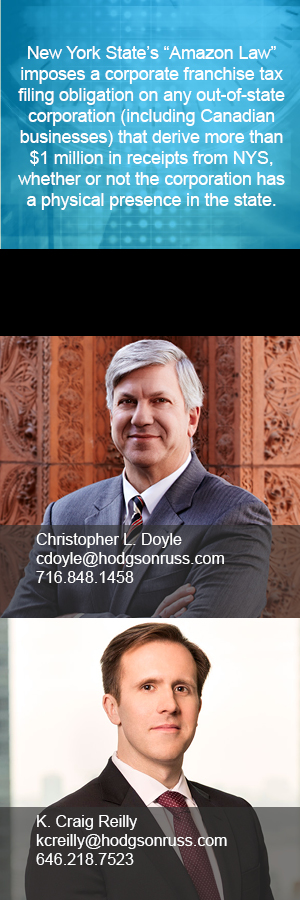New York's "Amazon Laws" Affect Canadian Businesses, Too
 Twenty-four years ago, the U.S. Supreme Court announced in Quill v. North Dakota, 504 U.S. 298 (1992), that in order for a state to require an out-of-state business to collect and remit sales and use taxes on its sales to in-state customers, the business must have a physical presence – such as a store, office or employees – in the state. This ruling permitted “remote” businesses, such as those engaged in on-line or catalogue sales, to avoid sales tax collection and remittance requirements. Since then, states have struggled mightily to pare back the Quill holding and stem the sales tax revenue lost to remote sales.
Twenty-four years ago, the U.S. Supreme Court announced in Quill v. North Dakota, 504 U.S. 298 (1992), that in order for a state to require an out-of-state business to collect and remit sales and use taxes on its sales to in-state customers, the business must have a physical presence – such as a store, office or employees – in the state. This ruling permitted “remote” businesses, such as those engaged in on-line or catalogue sales, to avoid sales tax collection and remittance requirements. Since then, states have struggled mightily to pare back the Quill holding and stem the sales tax revenue lost to remote sales.
Recently, South Dakota passed a law providing that every out-of-state remote seller must collect sales tax if their annual sales into the state exceed $100,000 or if the remote seller conducts at least 200 separate transactions with South Dakota customers in a year, regardless of any physical presence in the state.
New York State, along with several others, has adopted economic nexus standards that subject out-of-state corporations to state-level corporate income and franchise taxes based solely on in-state receipts. Also known as “Amazon or click-through laws,” New York now imposes a corporate franchise tax filing obligation on any out-of-state corporation (including Canadian businesses) that derive more than $1 million in receipts from NYS, whether or not the corporation has a physical presence in the state.
Proponents of these expanded nexus laws argue that local brick and mortar stores are harmed by existing laws that artificially distinguish between retailers with physical stores inside a state’s borders and those outside the state. According to supporters, the modern, digital economy means that retailers can be present everywhere and there’s no reason that large, digital retailers shouldn’t have to comply with the same rules as local “Mom and Pop” vendors.
Opponents claim that states such as South Dakota are blatantly violating Supreme Court precedent and impermissibly imposing unconstitutional tax compliance on out-of-state vendors. Online retailers also complain about the compliance costs of expanded tax nexus rules, noting the administrative headache of calculating and paying taxed in 50 different states.
Regardless of your personal views, online retailers – especially those with significant sales into a specific U.S. state, must now consider whether these sales trigger tax collection, reporting and/or payment requirement regardless of the fact that the retailer may have no physical presence in the state.
